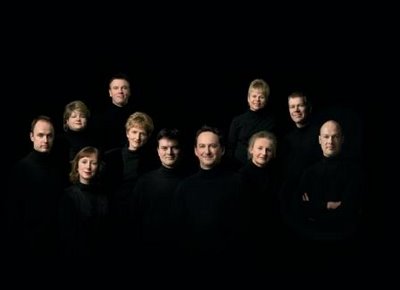 The Tallis Scholars, photo by Richard Haughton |
True, the roster of singers has changed in recent years, with Philip Cave, for example, now settled in the Washington area. The ensemble's blend is still pure, marred from time to time by slight disagreements of intonation between the sopranos. As in most choral groups, the ensemble sound is better than most of the individual voices, although the few solo moments during the concert were fine enough. All the things that go into making a fine choral performance were on display, perfectly united consonantal attacks, flawless intonation, harmonious blend and balance.
To open the program, eight of the ten singers on the tour gave a complete performance of the 1610 Mass for Four Voices, the retrogressive polyphonic setting of the ordinary that Claudio Monteverdi appended to his much more forward-looking 1610 Vespers. Sometimes in this piece, Monteverdi falls into the trap of one composing in an older style, in that the work can sound like a lesser composer of the previous century, relying heavily on paired imitations in S/A or T/B and long sections of homophony, especially in the Credo. High points included the third section of the Kyrie, with its descending sequences of thirds, the dance-rhythmed conclusion of the Credo, and the slow grandeur of the Benedictus.
| Tallis Scholars: Gombert Magnificats 1 (2002) Gombert Magnificats 2 (2002) John Browne: Music from the Eton Choirbook (2005) |
More daring and unusual repertoire was saved for the second half, slightly reordered from the program. John Browne's Stabat iuxta Christi crucem was a dark somber work for eight male voices, one covered by alto Caroline Trevor. Its full texture is animated by one or two more florid lines and jarring cross-relations, handled skillfully in this excellent performance (and available on the Tallis Scholars disc of Browne's pieces from the Eton Choirbook). Two settings of Media vita in morte sumus provided an opportunity to compare the styles of Roland de Lassus and Nicolas Gombert. The former uses a strict cantus firmus technique, with the chant melody set in one of the tenor lines, while the latter's appeal is much more directly emotional, with some striking cross-relations in the last line about bitter death (as recorded on the first-rate disc by the Hilliard Ensemble). One of Gombert's four-part Magnificat settings (all recorded by the Tallis Scholars), in alternatim with the mode 4 canticle tone, closed out the concert magnificently with its final verse expanded to six voices.
A sneak preview of the 2007-2008 season at Shriver Hall reveals the following highlights: the Salzburg Marionnette Theater (November 17 and 18), tenor Ben Heppner (December 2), baritone Nathan Gunn (January 13, 2008), cellist Alban Gerhardt (February 3, 2008), the Alban Berg Quartet (February 24, 2008), pianist Pierre-Laurent Aimard playing The Art of the Fugue (March 16, 2008), and the Choir of King's College, Cambridge (April 13, 2008).
Hello.
ReplyDeleteCan anyone tell me if Natalia Gutman will be performing in the U.S. this year? If so, when and where.
Thank you.
I have no information, but I would suggest contacting her manager: Aminah Domloge at Pro Artist in London -- info at proartist dot co dot uk.
ReplyDelete